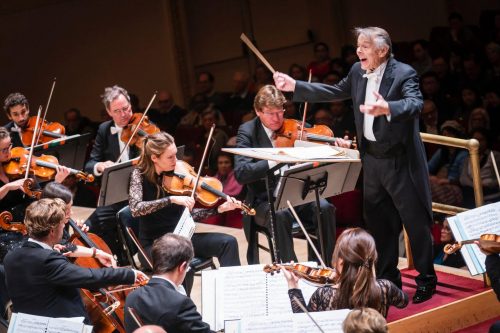 United States Strauss, Brahms: Diana Damrau (soprano), Bavarian Radio Symphony Orchestra / Mariss Jansons (conductor), Carnegie Hall, New York, 8.11.2019. (RP)
United States Strauss, Brahms: Diana Damrau (soprano), Bavarian Radio Symphony Orchestra / Mariss Jansons (conductor), Carnegie Hall, New York, 8.11.2019. (RP)

Strauss – Four Symphonic Interludes from Intermezzo Op.72, Four Last Songs
Brahms – Symphony No.4 in E minor Op.98
The first of the two Carnegie Hall concerts by the Bavarian Radio Symphony Orchestra with Mariss Jansons was bittersweet due to the obvious ill-health of the conductor, yet it was in some ways a cathartic experience. Jansons’ ill-health has been well publicized, and his physical state is alarming. Nonetheless, he persevered, ill-advised as it may have been, leading his orchestra in a program that served as a benediction on his distinguished career.
Under any circumstances, the works that Jansons programmed would have cast an autumnal pall. The concert opened with the Four Symphonic Interludes from Strauss’s opera Intermezzo, music that, while boisterous at times, is tinged with melancholy. The plot of the opera is autobiographical: a letter from a young woman was mistakenly delivered to the Strauss household and intercepted by his wife, Pauline. Outraged by its contents, Pauline contemplated divorce and continued to nurse a grudge long after the letter had been explained away. Strauss himself arranged the four interludes into an orchestral suite.
Once on the podium, Jansons conducted with unexpected vigor. Much of the drama and emotion, however, was supplied by the witty, exuberant solos that pepper the score. Particularly beautiful was the luminous playing of principal violist Hermann Menninghaus in the first interlude. Tender emotions, particularly warmth, emanated from the shimmering strings in the second interlude where the aggrieved wife yields to the deep love that she has for her husband. The elegant playing of the first chair string players set the tone for denouement at the card game where the mix-up is revealed, with the couple’s reconciliation turning into an exuberant romp replete with the crash of the cymbals.
It was announced that Diana Damrau was suffering from a cold but, much to the relief of her many fans in the audience, had agreed to sing. She looked absolutely ravishing in a white and coral-hued dress and stole, but glamour could only carry her so far. Damrau’s silvery lyric soprano is arguably too light for Strauss’ Four Last Songs and, under the circumstances, her voice made little impression. The high notes bloomed and carried through the hall, but the middle and lower ranges were all but inaudible, leaving the profound emotion of the songs to be expressed chiefly by the orchestra.
The start of the concert had been delayed without explanation. Later, the audience’s forbearance as they sat through an interminable intermission was remarkable. Spontaneous, good humored outbursts of applause erupted as they awaited the return of the orchestra and conductor. No explanation was given, but none was needed. (Patience, however, only extended so far, and there was considerable grumbling about the inaudible announcement that Diana Damrau was indisposed.) When the orchestra did walk on stage, they too joined in the waiting game.
When Jansons finally appeared, he was greeted with enthusiastic applause. Much has been made of the tragic, pessimistic nature of Brahms’ Fourth Symphony, and the composer himself wrote to conductor Hans von Bülow that it ‘tastes of the climate here; the cherries are hardly sweet here – you wouldn’t eat them!’ But rather than wallow in gloom, Jansons instilled the symphony with urgency and clarity. The string playing in the second movement was particularly stunning, while the Scherzo was brilliant with a relentless forward momentum that carried into the finale. The chords with which the symphony ends have, perhaps, never sounded quite so ominous as they did on this occasion.
Defying the odds, Jansons returned to conduct an encore, Brahms’ Hungarian Dance No.5, as if determined to end the evening on a joyful note. Each of his subsequent returns to acknowledge the audience’s cheers was an example of his spirit triumphing over the all-too-apparent reality of his physical state. Jansons leaned on Anton Barakhovsky, the orchestra’s principal concert master, and Menninghaus for support to acknowledge the applause, but walked off and on stage on his own, albeit haltingly.
If there is anyone who earns a New Yorker’s respect, it’s a fighter who never gives up. It was for Jansons’ indefatigable spirit, as much as gratitude for his decades of service to music, that the ovations given to him were from the heart.
Rick Perdian

Was in the Carnegie Hall witnessing this end of an era. It is the invincible struggle, the superb virtuosity, rather than timidity and death, that has no limits. Farewell, Maestro. You stay in those exquisite notes forever!
Indeed S&H mourns the passing of this legendary conductor and was pleased to witness this valedictory performance.
We´ll miss you, Mariss . . . In our hearts you´ll have a place as long as we live . . . Thank You for the spirit you´ve given to us . . .